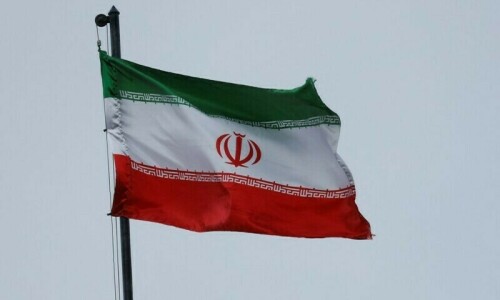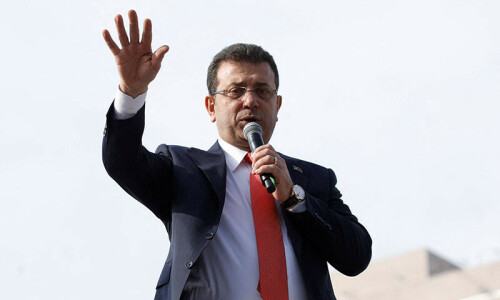KARACHI: After more than three decades and the burial of over 200,000 unclaimed corpses in the 30-acre Mowachh Goth graveyard of the Edhi Foundation, the number of bodies being buried without identification has almost halved during the over
three years thanks to a biometric scanning project that helped in identification of such bodies and tracing of their families.
The project, known as Shanakht, or Identity, has been successfully launched by the Citizens-Police Liaison Committee (CPLC) with the assistance of the National Database and Registration Authority (Nadra).
It achieved a milestone only last month when it identified a 2,000th body brought to the Edhi morgue as that of an unidentified person.
The Shanakht project helped identify a 2,000th unidentified body at a morgue last month
An official said the biometric scanning technology helped identifying the 2,000th body and was handed over to the victim’s family for burial.
The system, which was launched in 2015, has emerged as a major success to solve the city’s one of the crucial issues regarding identification of unclaimed bodies and tracing their families since hundreds of such bodies were buried by the Edhi Foundation every year at its Mowachh Goth graveyard.
“We launched the project in late 2015,” said CPLC’s Amir Hassan, the man behind the Shanakht project. “The results are really encouraging. The exercise that took so much time and efforts of different individuals and institutions are finally yielding results. By mid-May 2019 we identified 2,000th body which was lying unclaimed at the Edhi morgue. With the passage of time, it will improve further and we hope to touch 100 per cent mark soon.”
The system has been designed to work in the following manner.
When volunteers of the Edhi Foundation or Chhipa Welfare Association find an unclaimed body they would take its multiple thumb impressions with the assistance of CPLC staff at their facilities and send them to Nadra through CPLC software along with all relevant details and findings of police and a medico-legal report. Nadra takes a day or two to respond to the CPLC with all particulars about heirs of the victim.
Before Shanakht was put in place, there was no other system to identify such bodies and the Edhi Foundation used to bury them after keeping them for three days for any relative to contact and identify them at its morgue in Sohrab Goth.
They would take a photograph of the body for their record so that a relative who might turn up afterwards could identify their loved ones after leafing through the picture album of the buried persons. The number of the bodies identified with the help of photographs has, however, remained very negligible, given the lack of a technology-based mechanism.
But now, the number of bodies being buried at the Mowach Goth graveyard of the Edhi Foundation proves the effectiveness of Shanakht.
“The number of bodies buried has declined to a large extent,” said an official at the country’s largest charity. “If we go through the data of only five years before the launch of the CPLC project, it shows that we buried total 1,030 unidentified bodies in 2010; 1,791 in 2011; 1,517 in 2012; 1,650 in 2013 and 1,657 unidentified corpses in 2014. After 2015, the number is gradually on a decline as in 2016 number of unidentified bodies buried at Mowachh Goth graveyards stood at 615, 499 in 2017; 261 in 2018 and in 2019 we have so far buried 86 unidentified corpses.”
After initial success in tracing families of the unidentified bodies in the city, the CPLC has expanded its project in finding relatives and loved ones of those unidentified people who have been admitted to hospitals in an unconscious condition, injured or critically ill.
Mr Hassan, the head of Shanakht, said that in August 2018 the CPLC had set up a facility desk at three major public hospitals of the city — Jinnah Postgraduate Medical Center (JPMC), Civil Hospital Karachi and Abbasi Shaheed Hospital —to identify and trace the family of unidentified patients through biometric verification.
“Since then [August 2018] we have identified and traced families of some 36 patients who were brought unconscious to hospitals mostly after accidents of different nature,” said Mr Hassan. “In most cases, these patients suffer a memory loss or remain unconscious. We followed the same procedure and technology which we do for the unclaimed bodies and make efforts to reach their families. The results are promising and we hope it will become more effective with the passage of time.”
However, he deplored that the quality of response from emergency unit of one of the major hospitals remained below the desired level, which negatively affected the performance of the project. At the same time, he appreciated the role of other hospital’s management for being vigilant and cooperative with the CPLC.
“We receive very good and quick response from the Civil Hospital but unfortunately, it’s not the case with the JPMC. If the hospitals remain vigilant and quick to inform us about any such patient suffering memory loss or in an unconscious state, we will be able to react quick and trace his family,” he said.
Published in Dawn, June 10th, 2019
















































